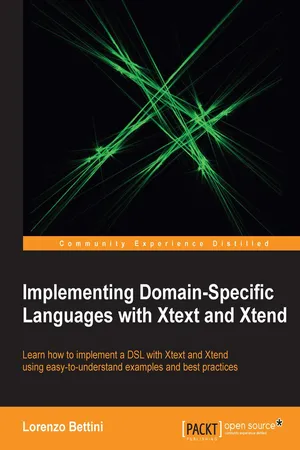![]()
Implementing Domain-Specific Languages with Xtext and Xtend
![]()
Table of Contents
Implementing Domain-Specific Languages with Xtext and Xtend
Credits
About the Author
Acknowledgement
About the Reviewers
www.PacktPub.com
Support files, eBooks, discount offers, and more
Why Subscribe?
Free Access for Packt account holders
Preface
What this book covers
What you need for this book
Who this book is for
Conventions
Reader feedback
Customer support
Downloading the example code
Errata
Piracy
Questions
1. Implementing a DSL
Domain Specific Languages
So, why should you create a new language?
Implementing a DSL
Parsing
The Abstract Syntax Tree (AST)
IDE integration
Syntax highlighting
Background parsing
Error markers
Content assist
Hyperlinking
Quickfixes
Outline
Automatic build
Summarizing DSL implementation
Enter Xtext
Installing Xtext
Let's try Xtext
The aim of this book
Summary
2. Creating Your First Xtext Language
A DSL for entities
Creating the project
Xtext projects
Modifying the grammar
Let's try the Editor
The Xtext generator
The Eclipse Modeling Framework (EMF)
Improvements to the DSL
Dealing with types
Summary
3. The Xtend Programming Language
An introduction to Xtend
Using Xtend in your projects
Xtend – a better Java with less "noise"
Extension methods
The implicit variable – it
Lambda expressions
Multi-line template expressions
Additional operators
Polymorphic method invocation
Enhanced switch expressions
Debugging Xtend code
Summary
4. Validation
Validation in Xtext
Default validators
Custom validators
Quickfixes
Textual modification
Model modification
Quickfixes for default validators
Summary
5. Code Generation
Introduction to code generation
Writing a code generator in Xtend
Integration with the Eclipse build mechanism
Standalone command-line compiler
Summary
6. Customizations
Dependency injection
Google Guice in Xtext
Customizations of IDE concepts
Labels
The Outline view
Customizing other aspects
Custom formatting
Other customizations
Summary
7. Testing
Introduction to testing
Junit 4
The ISetup interface
Implementing tests for your DSL
Testing the parser
Testing the validator
Testing the formatter
Testing code generation
Test suite
Testing the UI
Testing the content assist
Testing workbench integration
Testing the editor
Other UI testing frameworks
Testing and modularity
Clean code
Summary
8. An Expression Language
The Expressions DSL
Creating the project
Digression on Xtext grammar rules
The grammar for the Expressions DSL
Left recursive grammars
Associativity
Precedence
The complete grammar
Forward references
Typing expressions
Type provider
Validator
Writing an interpreter
Using the interpreter
Summary
9. Type Checking
SmallJava
Creating the project
SmallJava grammar
Rules for declarations
Rules for statements and syntactic predicates
Rules for expressions
The complete grammar
Utility methods
Testing the grammar
First validation rules
Checking cycles in class hierarchies
Checking member selections
Checking return statements
Checking for duplicates
Type checking
Type provider for SmallJava
Type conformance (subtyping)
Expected types
Checking type conformance
Checking method overriding
Improving the UI
Summary
10. Scoping
Cross-reference resolution in Xtext
Containments and cross-references
The index
Qualified names
Exported objects
The linker and the scope provider
Component interaction
Custom scoping
Scope for blocks
Scope for inheritance and member visibility
Visibility and accessibility
Filtering unwanted objects from the scope
Global scoping
Packages and imports
The index and the containers
Checking duplicates across files
Providing a library
Default imports
Using the library outside Eclipse
Using the library in the type system and scoping
Dealing with super
What to put in the index?
Additional automatic features
Summary
11. Building and Releasing
Release engineering
Headless builds
Target platforms
Continuous integration
Introduction to Buckminster
Installing Buckminster
Using the Xtext Buckminster wizard
Building the p2 repository from Eclipse
Customizations
Defining the target platform
Build headlessly
Maintaining the examples of this book
Summary
12. Xbase
Getting introduced with Xbase
The Expressions DSL with Xbase
Creating the project
The IJvmModelInferrer interface
Code generation
Debugging
The Entities DSL with Xbase
Creating the project
Defining attributes
Defining operations
Imports
Customizations
Summary
13. Bibliography
Index
![]()
Implementing Domain-Specific Languages with Xtext and Xtend
Copyright © 2013 Packt Publishing
All rights reserved. No part of this book may be reproduced, stored in a retrieval system, or transmitted in any form or by any means, without the prior written permission of the publisher, except in the case of brief quotations embedded in critical articles or reviews.
Every effort has been made in the preparation of this book to ensure the accuracy of the information presented. However, the information contained in this book is sold without warranty, either express or implied. Neither the author, nor Packt Publishing, and its dealers and distributors will be held liable for any damages caused or alleged to be caused directly or indirectly by this book.
Packt Publishing has endeavored to provide trademark information about all of the companies and products mentioned in this book by the appropriate use of capitals. However, Packt Publishing cannot guarantee the accuracy of this information.
First published: August 2013
Production Reference: 1140813
Published by Packt Publishing Ltd.
Livery Place
35 Livery Street
Birmingham B3 2PB, UK.
ISBN 978-1-78216-030-4
www.packtpub.com
![]()
Author
Lorenzo Bettini
Reviewers
Dr. Jan Koehnlein
Henrik Lindberg
Pedro J. Molina
Sebastian Zarnekow
Acquisition Editor
James Jones
Lead Technical Editor
Neeshma Ramakrishnan
Technical Editors
Dipika Gaonkar
Anita Nayak
Sonali S. Vernekar
Project Coordinators
Shiksha Chaturvedi
Hardik Patel
Proofreader
Paul Hindle
Indexer
Rekha Nair
Graphics
Sheetal Aute
Ronak Dhruv
Abhinash Sahu
Production Coordinator
Aparna Bhagat
Kirtee Shingan
Cover Work
Aparna Bhagat
![]()
Lorenzo Bettini is an assistant professor (Researcher) in computer science at Dipartimento di Informatica, Università di Torino, Italy. Previously, he was a Postdoc and a contractual researcher at Dipartimento di Sistemi e Informatica, Università di Firenze, Italy.
He has a Masters Degree in computer science and a PhD in theoretical computer...
